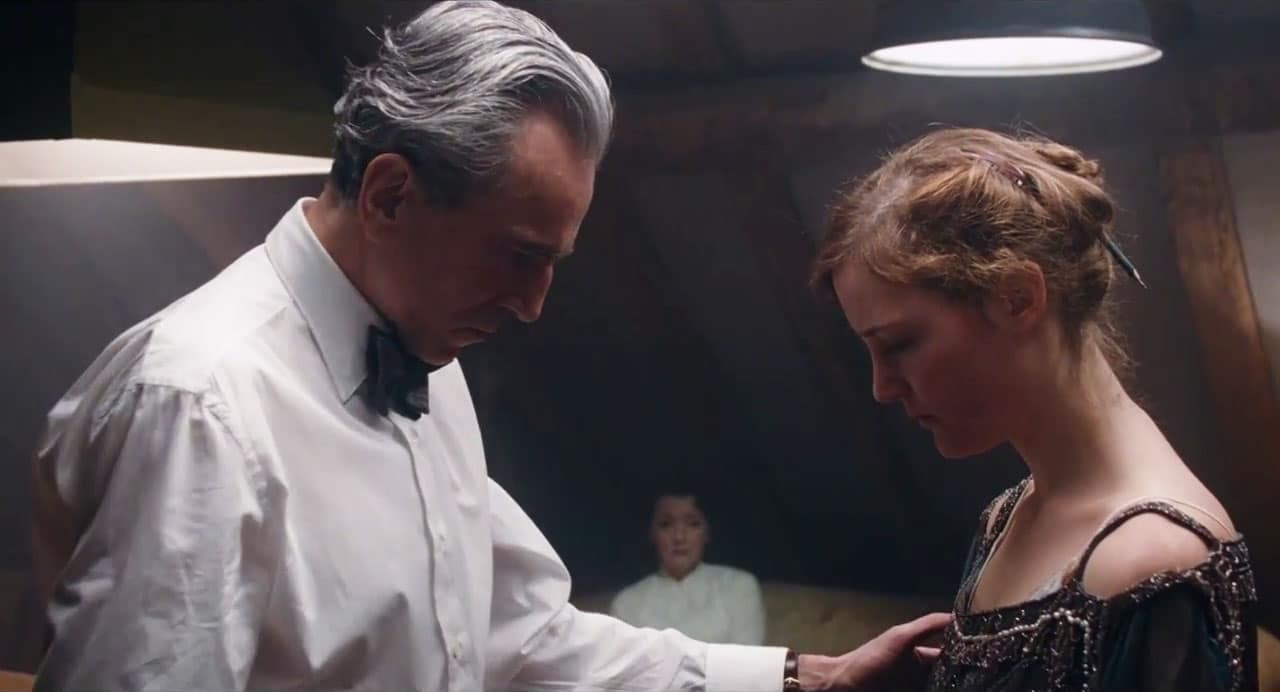By Mark Saldana
Rating: 4 (Out of 4 Stars)
From the first frame to its very last, Paul Thomas Anderson’s Phantom Thread is an aesthetically elegant affair. The production design, the exquisite costumes, the fantastic score by Jonny Greenwood, and the gorgeous cinematography done by Anderson, himself, all play their part in bringing a breath-taking mask of beauty which actually hides something more ugly, unnerving and even sinister. One can almost get completely lost in the film’s allure and completely forget that they are watching a P.T. Anderson movie. That is, until the auteur reveals his ace-in-hole. Phantom Thread defies all expectations and in my opinion, is Anderson’s best film since There Will Be Blood.
In 1950s London, confirmed bachelor Reynolds Woodcock (Daniel Day Lewis) spends most of his days designing and creating luxurious dresses for wealthy clientele and royalty. Fully committed to his art and craft, Woodcock has never been able to maintain a long term relationship. He has never been able to compromise much of his carefully planned and strictly regimented daily routines for any one woman. Any disruption in the routine threatens his ability to create his work. Shortly after ending one relationship with a woman, Reynolds becomes taken with a young waitress named Alma (Vicky Krieps). In a short amount of time, Alma becomes his muse, lover and one of his assistant dressmakers. As the romance of the relationship tempers and Reynolds becomes immersed in his work again, the defiant Alma must battle the strong, immovable will of Reynolds to remain the love of his life.
Now I know my synopsis makes this film sound like a typical romance story, but Anderson’s film is anything, but that. I simply do not wish to reveal too much and can only offer an oversimplified summary of the plot. The acclaimed and talented writer/director offers a twisted and subversive take on romance even more unnerving than some of the events in his previous love story Punch Drunk Love. PDL is rather light and sunny compared to the some of the things that happen between Reynolds and Alma. It is a truly fascinating take on the dynamics between two people trying to maintain a romance despite their own selfish desires and needs. It is definitely an inventive and disturbing take on the compromises and power sharing necessary to make relationships work.
What also makes this movie so special is Anderson’s exceptional use of humor. Phantom Thread might be dark and forboding at times, and definitely graceful throughout most of the run time, but not everything plays out seriously. At the conclusion of the screening, a friend and colleague described the movie as a romantic comedy and the fact is that he is absolutely correct. The power struggles, the disruptions to Woodcock’s routines, the reactions to the various catalysts of conflict all throughout the movie are truly uproarious. It isn’t typical, commercial rom-com material, but the fact is that Anderson has created an opulent, but dark and twisted romantic comedy. It is a comedy that obviously draws some inspiration from Shakespeare, Hitchcock and even Kubrick. Anderson has improved his craft so much that his influences manifest more subtly than in his earlier films.
Both Day-Lewis and Krieps are perfectly cast in their roles, and share an incredible chemistry and fiery passion together. Daniel Day-Lewis has no trouble portraying the highly cultured and charming artist that is Reynolds Woodcock, with all of the idiosyncracies and petulance that can come with being a spoiled artist. Vicki Krieps gives a deliciously sublime turn as the more uncouth and seemingly naive, but nevertheless beautiful and strong-willed Alma. She deceptively comes across as meek at first, but her initial awkward coyness melts away as she attempts to take greater control of the relationship. The movie also can boast an outstanding supporting turn by Leslie Manville, who portrays Cyril Woodcock, Reynold’s sister and chief assistant. Manville portrays another strong-willed character in Reynold’s life, but one who knows how to choose her battles carefully.
And before anyone has any preconceived notions about what they are about experience in Phantom Thread, one must never forget that this is a Paul Thomas Anderson movie. If expecting a purely glamorous and ornate love story that will warm the heart and make people fall in love with romance, then one should completely abandon these expectations and behold something different all together. Fans of Paul Thomas Anderson’s previous film are in for a huge wicked treat. Those unfamiliar with his previous films should probably do their homework before choosing this one. As Alma warns Reynolds, I must extend the same warning to the uninitiated, “Whatever you do, do it carefully.”
Addition Notes: For those who have the opportunity to see the movie in the 70mm format, I must highly recommend this version. I had the opportunity of seeing both the 70mm and digital versions, and the film version looks way better.
